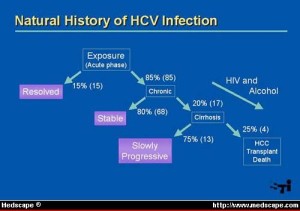This page is an archive. Its content may no longer be accurate and was last updated on the original publication date. It is intended for reference and as a historical record only. For hep C questions, call Help4Hep BC at 1-888-411-7578.
Typical Symptoms

DO NOT SELF-DIAGNOSE. The list of symptoms below is not exhaustive, and overlaps with symptom lists of many other diseases. A diagnosis of hepatitis C requires further confirmation through medical testing.
Important points:
- Most people with hepatitis C virus (HCV) are asymptomatic (no symptoms) for many years.
- There are four major phases of hepatitis c (acute, chronic, cirrhosis, and de-compensation/failure), each with its own possible symptoms.
- It is highly unlikely that anyone will have all the possible symptoms of a phase; very often they will have none of them.
- Everyone is unique in the way their body reacts to HCV.
- Often abnormal blood tests are the only signs of infection; even these are sometimes normal for many years while serious damage is being done to the liver.
- Use of alcohol or co-infection with HIV worsens the symptoms and hastens the progression of hepatitis C.
Possible Symptoms of Acute hepatitis C
- almost indistinguishable from acute hepatitis B infection
- frequently asymptomatic (there are no symptoms), even when liver tests are abnormal
- flu-like illness with fatigue, fever, muscular aches and pain, nausea and vomiting
- about 10% of patients become jaundiced (their skin turns yellow)
- generally these symptoms resolve and the patient has no symptoms of liver disease for many years
- symptoms may occur from two weeks to six months after exposure but usually within two months.
Possible Symptoms of Chronic hepatitis C (in general order of frequency) – View images of “Stages 1 – 3” in Stages of Liver Disease.
- fatigue, ranging from no symptoms at all, to gradually progressive fatigue and lack of energy, to complete debility; can vary widely between individuals and over time
- joint and muscle pain
- memory loss and mental confusion
- skin problems such as dry or itchy skin, rashes, and spots, red palms, spider veins, lichen planus
- depression, anxiety, irritability
- indigestion, nausea, vomiting, gas, constipation or diarrhea, and inability to digest certain foods (especially common: some fats, proteins, and dairy products)
- metabolic syndrome, pre-diabetes, fatty liver disease (see image below)
- sleep disturbances
- pain or discomfort in abdomen, especially upper right quadrant
- loss of libido
- chills, sweating, hot/cold flashes
- eye or eyesight problems, dry eyes
- hyper-sensitivity to heat or cold
- vertigo, dizziness, lack of coordination, tinnitus, hearing loss
- flu-like symptoms
- headaches
- urinary tract infections, kidney infections, and strange odor or colouration to the urine
- fever
- slow healing and recovery
- susceptibility to illness, infection, flu (or sometimes the opposite -some have an usually low susceptibility to illness due to a hyperactive immune system continually fighting HCV)
- weight gain, water retention, swelling of stomach, legs, or feet (edema)
- menstrual problems
- appetite loss/weight loss
- oral or mouth sores or dental problems, dry mouth
- excessive bleeding (nosebleeds, longer clotting time, occasional bloody stools)
- various autoimmune disorders such as sicca syndrome, chronic polyarthritis, polydermatomyositis, fibromyalgia, autoimmune thyroiditis, lung fibrosis, and diabetes mellitus may develop
- extra-hepatic effects of HCV (those affecting organs other than liver) can impact kidneys and urinary tract system, skin, joints and bones (including osteoporosis – even in men and young people), blood vessels, heart and circulatory system (including vasculitis and heart disease), nervous system and brain

